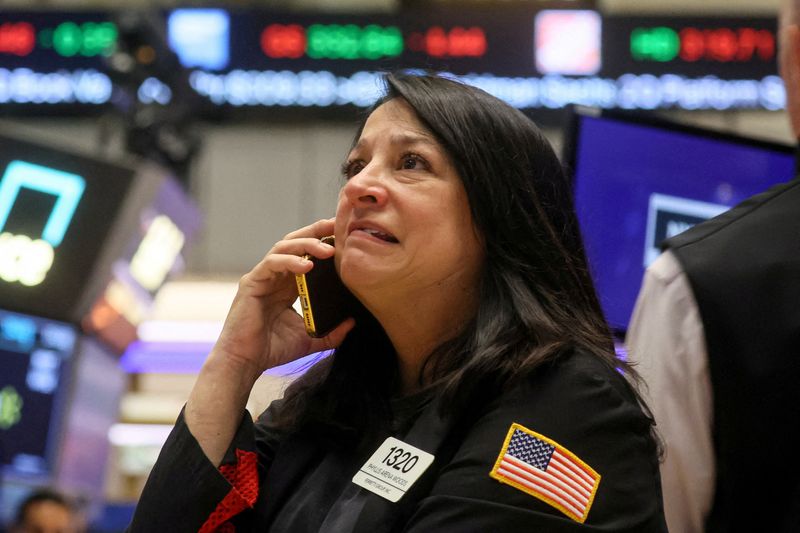By Yoruk Bahceli, Alun John and Dhara Ranasinghe
(Reuters) -Cracks are forming in a global stocks rally, with surging bond yields, rising energy prices and intensified worries over China’s economy among the factors sapping investors’ risk appetite following months of gains in equity markets.
The MSCI All Country World Index was down nearly 6% from its recent highs as of Friday's close, though still up 10% for the year. The S&P 500 is down about 5% this month, as is Europe's STOXX 600. Japan’s Nikkei has slid by around 5%.
Here are five corners of the market investors are paying particularly close to attention to:
One key worry for investors is a surge in bond yields that has come as signs of stronger-than-expected growth in parts of the global economy fuel bets on central banks leaving interest rates at current levels for longer than expected.
Yields on the benchmark U.S. 10-year Treasury hit their highest level in 15 years on Monday. Meanwhile, U.S. real yields, which show what investors can expect to earn on government bonds after adjusting for inflation, stand near their highest point since 2009.
Yields in other economies have also pulled higher. Britain’s 10-year real yield, for instance, on Thursday rose to its highest since last October.
One worry is that higher yields on Treasuries and other government bonds will make stocks less attractive at a time when valuations have ballooned in many countries.
Benchmark yields also guide other key economic rates, raising the cost of capital as they climb. U.S. mortgage rates surged this month, with the popular 30-year fixed rate hitting the highest level in more than 21 years, further complicating the housing market outlook.
Rising yields have also supported the dollar, which is up about 4% from its recent lows against a basket of currencies. More dollar strength could be an unwelcome development for everyone from U.S. exporters and multinationals, who need to convert profits back into their home currency, to emerging market economies, as it makes it more difficult for them to service dollar-denominated debt.
Rising energy prices are stirring worries that the inflation jolt to the world economy is not over yet, even if price pressures have cooled.
European gas prices have jumped 47% so far in August, set for the biggest monthly increase since November. Oil prices are not far off nine-month highs.The signals from energy markets, keys driver of inflation and inflation expectations, mean that prices pressures remain elevated, adding to a narrative of interest rates staying much higher for longer than anticipated earlier this year.
In Europe, a key long-term gauge of market inflation expectations remains well above the European Central Bank's 2% inflation target. Data this past week showed basic wages in Britain growing at their fastest rate for at least two decades, adding to worries for the Bank of England about long-term inflation pressures even after 14 back-to-back rate hikes.
Higher bond yields, falling equities and a rising dollar are all tightening financial conditions fast, adding to investor concerns.
Financial conditions reflect the availability of funding in an economy and central banks have been working to tighten them to stamp out inflation above their targets.
Since the start of August, a widely-used U.S. financial conditions index (FCI) compiled by Goldman Sachs has tightened some 50 basis points to just under 100, the tightest level since May and a level Goldman says corresponds to the long-run average. The bank has previously shown that a 100-basis-point tightening in conditions crimps growth by one percentage point in the coming year.
Still, U.S. financial conditions are significantly looser than their peak last fall, when the index was nearly 100 basis points above current levels, Goldman's data shows.
An unprecedented debt crisis in China's property sector, adding to a slew of weaker-than-expected data in the world's second largest economy, is also top of mind for many investors, who fear further problems could spill over into global markets.
Property accounts for roughly a quarter of China's economy, which is already suffering from tepid domestic consumption, faltering factory activity, rising unemployment and weak overseas demand. The country's heavily property-exposed $3 trillion shadow banking sector is already in trouble.

Both Hong Kong's share benchmark and China's currency are at their softest since November, and investors globally are taking note.
Of course the arrival of a long-awaited but so far absent big stimulus package from Chinese authorities could turn things around.